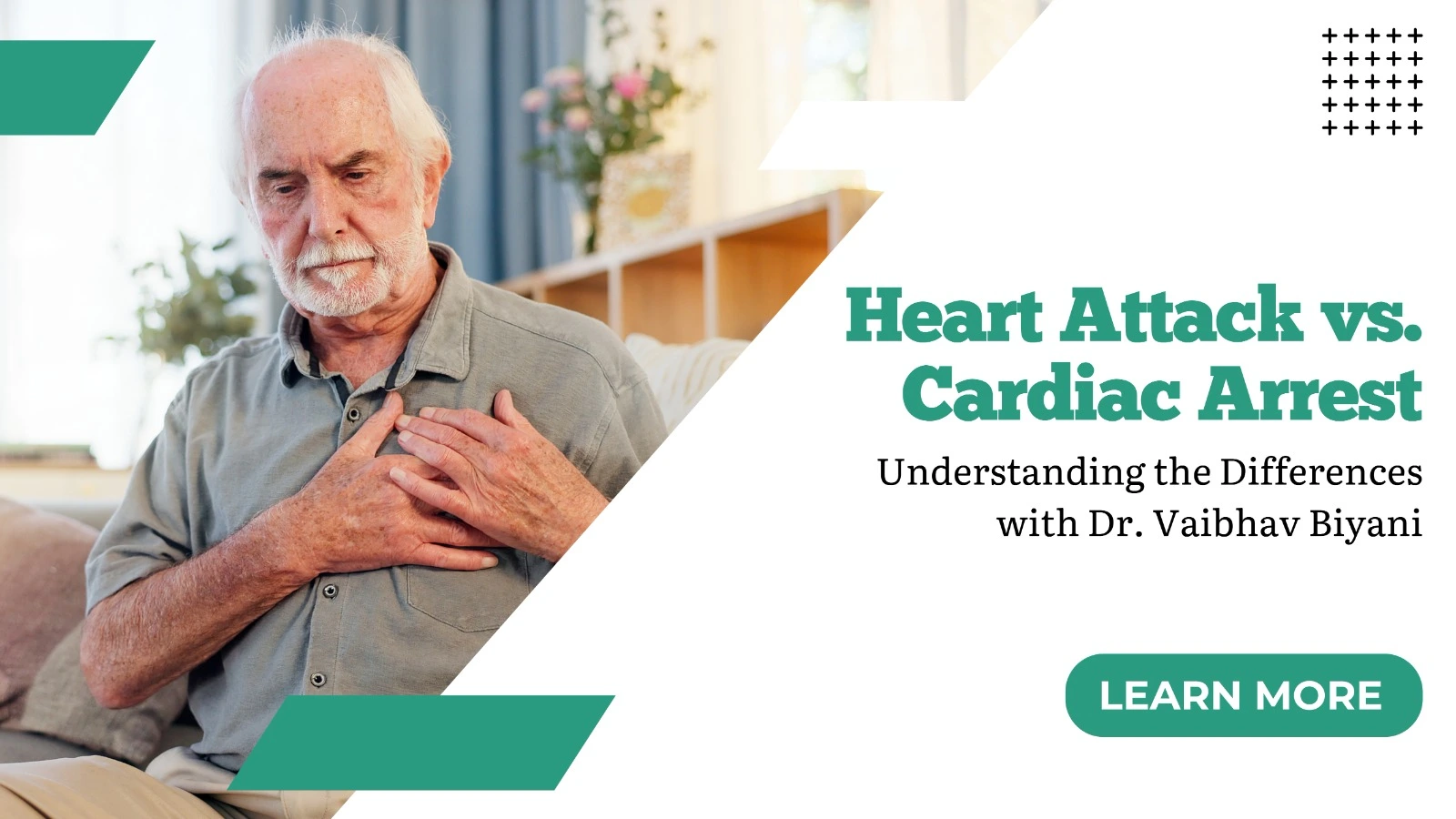Our Links
Contact Us
Chamber 4, Block-908, B-wing , Lokmat Bhavan, Lokmat Square, Nagpur, Maharashtra 440012
Copyright © 2024 DR. VAIBHAV BIYANI All rights reserved.
Design & Marketed by DGTurn

Many people use the terms “heart attack” and “cardiac arrest” interchangeably, but they are two distinct medical emergencies. While both conditions affect the heart, their causes, symptoms, and treatments are different.
Dr. Vaibhav Biyani, an expert cardiologist, explains the differences between a heart attack and cardiac arrest and how to respond in each situation.
What Is a Heart Attack?
A heart attack (myocardial infarction) occurs when blood flow to the heart is blocked, usually due to a buildup of plaque in the coronary arteries.
🚨 Symptoms of a Heart Attack:
✔️ Chest pain or discomfort
✔️ Shortness of breath
✔️ Cold sweat
✔️ Nausea or vomiting
✔️ Pain in the arms, neck, or jaw
💡 What to Do:
✔️ Call emergency services immediately.
✔️ Keep the person calm and seated.
✔️ If prescribed, take aspirin to thin the blood.
What Is Cardiac Arrest?
Cardiac arrest is a sudden loss of heart function caused by an electrical malfunction in the heart. This leads to an immediate stop in blood flow to the brain and other organs.
🚨 Symptoms of Cardiac Arrest:
✔️ Sudden collapse
✔️ No pulse
✔️ No breathing
✔️ Loss of consciousness
💡 What to Do:
✔️ Call emergency services immediately.
✔️ Begin CPR (chest compressions) immediately.
✔️ Use an Automated External Defibrillator (AED) if available.
Key Differences Between a Heart Attack and Cardiac Arrest
| Factor | Heart Attack | Cardiac Arrest |
| Cause | Blocked blood flow to the heart | Electrical malfunction in the heart |
| Consciousness | Patient is usually conscious | Patient collapses and is unconscious |
| Treatment | Medications, stents, or surgery | Immediate CPR and defibrillation |
Why Immediate Action Is Crucial?
For both heart attack and cardiac arrest, timely medical intervention can save lives. Dr. Vaibhav Biyani urges everyone to learn basic CPR techniques and recognize warning signs early.
If you or a loved one experience symptoms of a heart attack or cardiac arrest, seek medical help immediately.
Hypertension: The Silent Killer and How to Manage It
Hypertension (high blood pressure) is often called the “silent killer” because it shows no symptoms until significant damage is done. It is a major risk factor for heart disease, stroke, and kidney failure.
Dr. Vaibhav Biyani provides insights into hypertension, its risks, and how to manage it effectively.
What Causes Hypertension?
🔹 Unhealthy Diet – Excess salt, processed foods, and sugary drinks.
🔹 Lack of Physical Activity – A sedentary lifestyle contributes to high blood pressure.
🔹 Stress – Chronic stress raises cortisol levels, increasing blood pressure.
🔹 Genetics – A family history of hypertension increases risk.
How to Manage Hypertension?
🩺 Dr. Vaibhav Biyani’s Recommendations:
✔️ Eat a Balanced Diet – Reduce salt intake, eat more fruits and vegetables.
✔️ Exercise Regularly – Aim for at least 30 minutes of moderate activity daily.
✔️ Monitor Blood Pressure – Check your blood pressure regularly and consult your doctor.
✔️ Manage Stress – Practice relaxation techniques like deep breathing and meditation.
✔️ Take Medications as Prescribed – If diagnosed, follow your doctor’s treatment plan.
Final Thoughts
Hypertension can be managed with lifestyle changes and medical supervision. Dr. Vaibhav Biyani urges individuals to take control of their health through preventive care.
If you have concerns about hypertension, schedule a consultation with Dr. Vaibhav Biyani today.